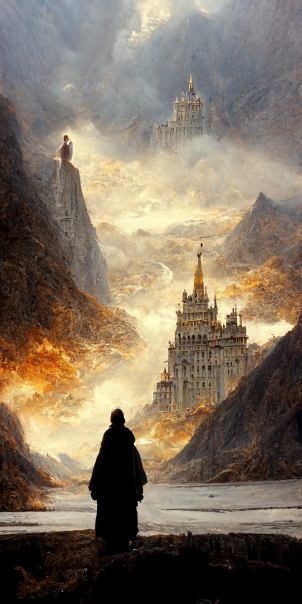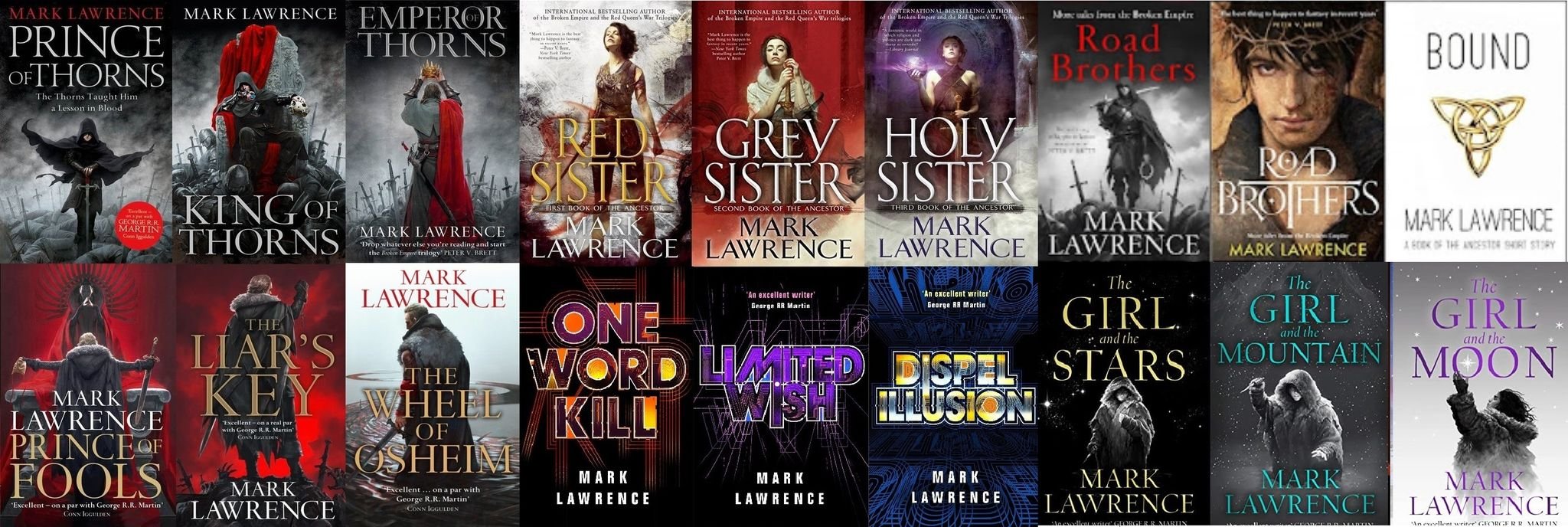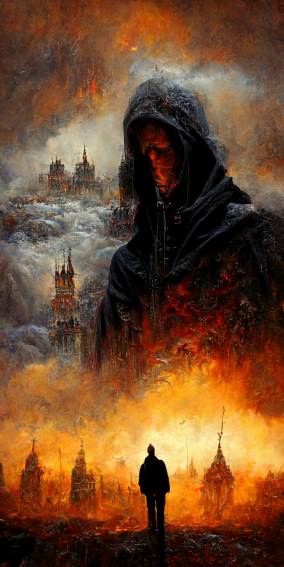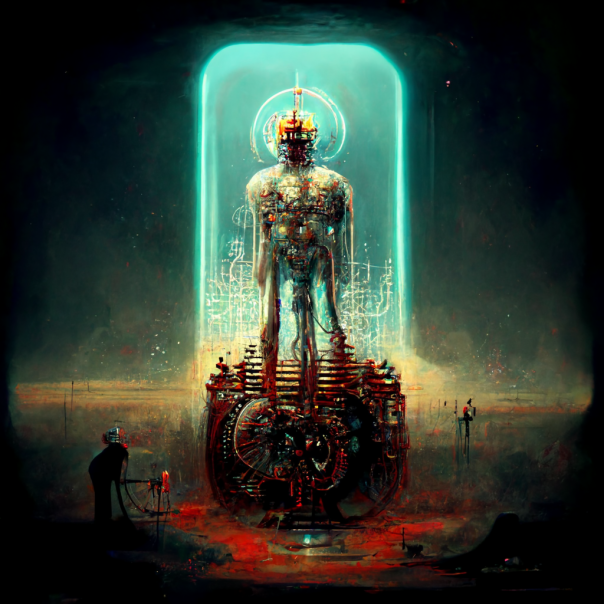Author Mark Lawrence (Art by Midjourney and Rune S. Nielsen.)
I was very (very!) lucky to get an interview with Mark Lawrence. Yes, you heard right. None other than the famous author and founder of the SPFBO is here for a chat!
Sorry, I just have to stop hyperventilating before we begin. Mark Lawrence is here, yay…Mr. Lawrence, this interview will take us through a bit of your past, present, and future. Let’s begin with the past.
Well, it was good enough for the cosmos…
If you think back, why did you decide to create a competition such as the SPFBO for self-published books? And did you perhaps come up with the idea together with some of the bloggers that became the first judges?
Well, here’s the moment it was born:
That’s Sarah Chorn (who ran Bookworm Blues as a review blog at the time) replying. And the subsequent conversation refined the details.
As to the why – why questions are always difficult. The answer to why questions often morphs over the years. I think the most honest answer is that I have a restless imagination and am always looking for new things to do/make/take apart. The spark for it was survivor guilt. I didn’t come out of self-publishing but I came out of a lot of time spent in writing groups, and encountered a bunch of great writers who didn’t get a lucrative book deal like the one I’d been given a few years earlier. They didn’t get anything at all. It seemed a bit of a lottery, and I wanted to find a way to give writers another chance to shine – another chance for their skill to bring them success.
“Part of me thinks when we’ve done 10 years it would be fun to put each of the champions in as a contestant to find the champion of champions.”
Back in 2015 when the first SPFBO launched, did you dare to hope that the competition would become such an impactful and social self-publishing extravaganza? Not to mention an all-year-spanning event.
I always thought it would be a slow rolling thing – you can see in that initial message I was thinking of a year or 18 months.
Author Mark Lawrence (Art by Midjourney and Rune S. Nielsen.)
And no, I had no idea whether the “if you build it, they will come” principle was going to work. That first year we just trickled over the minimum starting field requirement of 250 books, taking several days to reach 267. I think this year we reached the 300 limit in 9 hours.
What got you into writing?
Fantasy got me into writing. I became addicted to D&D in 1977 when I started at a school just a stone’s throw from the UK’s first Games Workshop. So, I wrote D&D scenarios. And after my first degree I went to run a Play-By-Mail game that I’d started playing a year earlier. That entailed writing (by hand) turns for hundreds of players in a free-ranging fantasy world in reply to the turns they sent in saying what they would do.
Eventually, I started writing for writing’s sake. First by myself, then online in writing groups, and it became an end in itself, rather than a necessary part of a game.
Name: Mark Lawrence
Born: 1966
The award-winning author is estimated to have sold more than 2 million books since getting his first novel, Prince of Thorns, published in 2011. At the time of writing, Mark Lawrence has gotten fifteen fantasy novels published (across five series.) Released several books on Wattpad, written many short stories, and also poems. He has a degree in physics, a PhD in mathematics, and formerly worked as an AI-reserarcher.
Why did you choose to write fantasy? And why grimdark?
I like to read fantasy. My mother read me The Lord of the Rings when I was 7. It’s my preferred reading genre, so I (mostly) write in it too. My Impossible Times trilogy is real world/scifi.
I am (primarily) a fantasy writer. I’m not (primarily) a grimdark writer. I write a broad range of stories. Sadly, the reading public have a general expectation that writers will continue to write the same book in different clothes, and are not particularly open to the idea that authors can have a diverse output. Hence, an author tends to get pigeonholed on the basis of their best known (often first) book.
Now, it’s time to ease into talking about the present. It seems to me that every year the SPFBO gets stronger. Do you and the judges do something extra each year, or why do you think this is?
I think it’s simply a combination of knowledge of the competition’s existence spreading into new communities, and the number of self-publishing fantasy authors increasing. It’s entirely word of mouth.
What’s the best thing about being a writer?
Freedom.
What’s the hardest thing about being a writer?
Too much freedom.
How do I get to be just as successful as you? Just kidding! Or maybe not? Do you have a tip, some wisdom, or an author app, tool, or resource that you can really recommend we try?
I wrote a blog about this the month after being published.
The tl:dr is that it’s mostly luck.
I tend to feel that writerly advice is mostly the chicken explaining its dance to you. A reference you’ll need a background in psychology to appreciate, or 2 minutes and this link (see how easy it is to skim the best bits of science off the top?).
And now it's time to yank out your Palantir! Let’s talk about the future. What new projects are you working on?
Currently I’m writing the final 10% of book 3 in my trilogy to be published in 2023/4/5.
The first book (out in April) is called The Book That Wouldn’t Burn, and is set in an endless library.
The thing I really need a Palantir for is to know what I’ll be writing after that. I’ve got the start of a book called Jacob’s Ladder on Wattpad. Readers have been very enthusiastic about it – so I might carry that on. There’s also The New World novella that’s in the Grim Oak Press omnibus for The Red Queen’s War. That’s the start of a Jalan & Snorri book that I might finish… Or perhaps I’ll just dive into something entirely new!
What dreams do you have for the SPFBO?
Part of me thinks when we’ve done 10 years it would be fun to put each of the champions in as a contestant to find the champion of champions. But that would require all 10 of them to be up for it. Plus, I’m not sure it really serves the contest’s goal of shining a light on overlooked books.
Author Mark Lawrence. (Art by Midjourney and Rune S. Nielsen.)
So, I guess I don’t really have any special ambition for it. It already does what it says on the tin and serves a useful end. There’s a sister contest for science fiction now, SPSFC, organized by author Hugh Howey. I guess there could be more for other genres, but that’s something for other people – fantasy’s my bag.
We've seen a lot of advances in what AIs are capable of. Today, AIs like Midjourney and DALL·E 2 make anyone capable of creating beautiful and complex images in seconds by typing in a short text prompt. What is your take on such AI fantasy art, and would you use such in future projects/books?
The first thing to say is that I don’t know enough about the science here to have anything more than a layperson’s view on the subject of AI art. But it’s certainly fascinating.
The real question for me is to what extent it’s “just” a pretty toy, and to what extent can it tell us something important about intelligence in this form. We have a long history of adding meaning after the event and creating illusions of intelligence/meaning where none exist. Astrology and fortune cookies show our enthusiasm for construing significance where there isn’t any.
Consider google. I can type in “girl with flaming eyes” and get a lot of cool images of girls with fire in their eyes. The search engine didn’t create that art.
I see the excellent examples of AI art on your blog post and I wonder to what degree it is possible to identify any given piece as a collection of images painted by human artists or photographed by someone. A collection of raw ingredients that I can understand were somehow combined, through scaling, shading, warping, extraction etc to create the final piece of AI art.
I don’t know the answer, and I’d love to know. Are these bits of AI art wholly dissimilar to anything produced by people? Are they clearly manipulations/combinations of a small number of known pieces?
The more difficult question is then: where along that sliding scale, if anywhere, does a recognized form of intelligence start to manifest?
We have criteria for talk-bots that act as intelligence tests for them. If a talk-bot could converse endlessly on myriad subjects, showing memory, the ability to form and change opinions etc, if it could convince us that a human is on the other side of the screen … many would call that intelligence. If an art-bot could create wholly original works of art that the denizens of art galleries would praise and be unable to separate from the works of mankind … would that be intelligence?
A super interesting point, Mr. Lawrence. I doubt that Google’s chatbot, LaMDA AI, is sentient as claimed by a single Google employee. However, it will happen at some point. Already specialized AIs score better than humans in exams and tests, beat most players in games, and some can even do stuff like computer programming on the fly, or as we are discussing, art.
Take a guess: When will we see a decent fantasy novel written by an AI author?
I honestly have no idea. I think to do that, you would need to create an intelligence that could also pass any other test for intelligence, and at that point AI would be a “solved problem”.
(Art by Midjourney.) Since doing the interview, I learned that at least one writer uses AI to help her write her books. The future is not pulling punches or waiting for us to get ready!
Rune’s guess: Within 10 years an AI will become sentient. But most humans will refuse to believe it or just disregard the notion as it’s more convenient for us not to deal with such things.
—> What do you think dear reader?
Whether intelligence is something that can, even in theory, be realized within a computer, is an open question. Most seem to believe it can, and that a sufficiently powerful computer, combined with clever coding, could reproduce the function of a human brain. Some (like Roger Penrose) don’t.
It’s a fascinating topic. Recently, startling advances in performance have been made simply by drastically increasing the size of the neural networks employed. A result that wasn’t widely predicted. And one that opens the door to exciting developments as our technology offers the possibility of further expansion in scale.
Indeed, it is fascinating. Anything else you would like to say before we close?
BUY MY BOOK!
Alright, alright, I’ll buy one of your books.
Thank you for some enlightening conversation. Best of luck with your projects. May the SPFBO continue for a long time.








